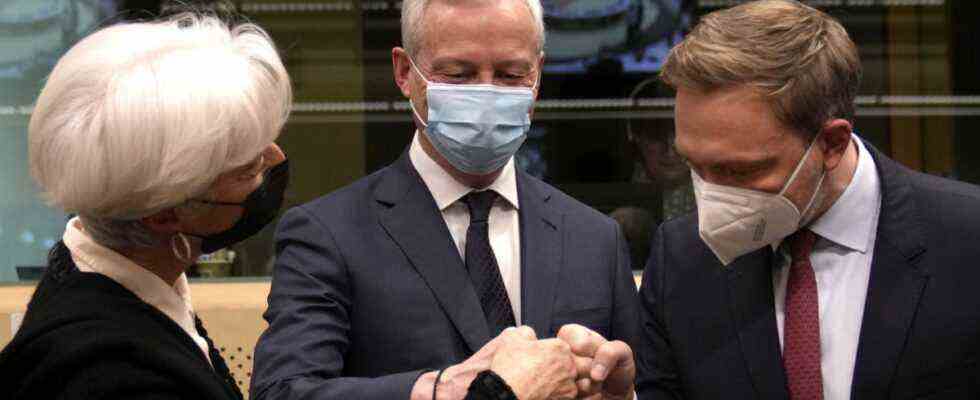Bruno Le Maire is to blame for the fact that Christian Lindner has to be patient. When he arrives at the Council building in Brussels, the French finance minister speaks for a long time into the microphones and cameras of the waiting journalists, and only then is it Lindner’s turn. Therefore greets him Le Maire friendly – and in German: “Hello, Christian, how are you?” Lindner accepted for the first time on Monday afternoon the Euro Group part, the meeting of the finance ministers of the euro countries. The meeting of all EU finance ministers is scheduled for Tuesday morning.
There are many controversial issues in the EU’s economic and financial policy – and the FDP politician was presented with a nice selection in his first meeting with his counterparts. Among other things, the top politicians wanted to exchange views on reforms to the Stability Pact, i.e. the rules for sound budget management, on the ambitious and tough project of the banking union – this is about hurdles for cross-border banking transactions – and about the implementation of the global minimum tax.
With regard to the Stability and Growth Pact in particular, the counterparts are eagerly awaiting how Lindner will position itself. The EU Commission issued in October a reform debate on; she intends to submit proposals by the summer. No directional decisions were expected from the exchange of ministers on Monday.
France’s Finance Minister Le Maire and his Italian counterpart are promoting easing, while Austria’s Finance Minister emphasized his resistance to this in an interview on Monday – and that he hopes for the support of the German government. In their election program, Lindner’s FDP warned against loosening the pact. However, no red lines are drawn in the coalition agreement, but a “further development” of the regulations is sought: The regulations should enable growth and state investments in climate protection without the debt burden becoming too great.
“We are not dreamers,” says Lindner in the direction of “Bruno”
Finally, as Lindner at the Brussels Council building, Le Maires Platz in front of the cameras he emphasizes that he is “open” to improvements in the regulatory framework, but what remains is “a smart balance” between limiting government debt and stimulating investment: “Fiscal rules are crucial to maintaining the credibility of states in the capital markets .” So Lindner fears that regulations that are too lax and debts that are too high could endanger the confidence of the financial markets in the euro zone – just like in the sovereign debt crisis, when Greece’s exit from the euro zone was even in the air.
The most important specifications of the pact are the upper limit for the annual budget deficit of three percent of economic output and the target for total government debt of 60 percent of economic output. Because of the pandemic, the Commission suspended the regulations. At the beginning of 2023, however, the stability pact should come into force again, and according to forecasts only seven out of 19 euro countries will be able to meet the 60 percent mark that year.
This fact alone makes reforms likely. Looking at his French counterpart “Bruno”, Lindner says, “we are both realistic politicians and not dreamers”. When it comes to the stability pact, the only question is where reality ends and dreams begin.

